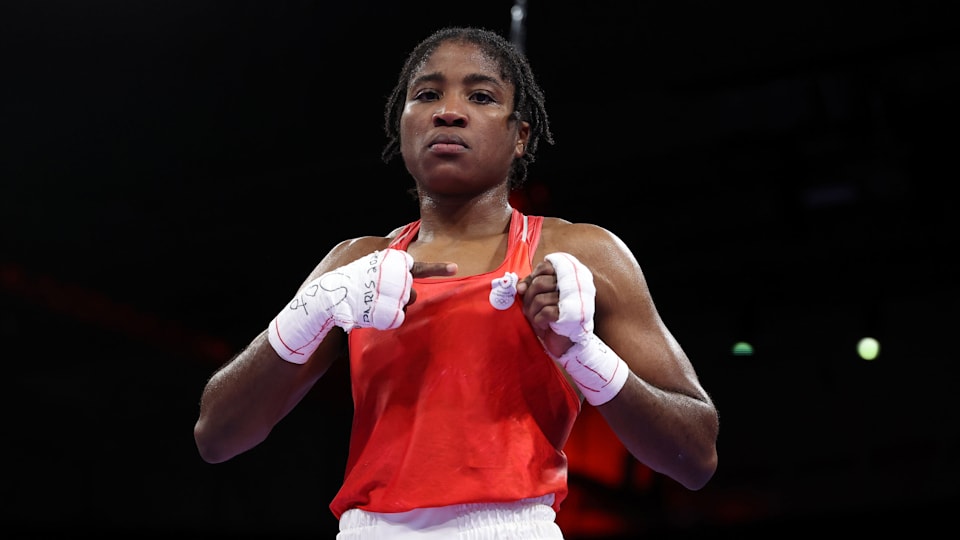Refugee Olympic medallist Cindy Ngamba exclusive: "Boxing pressure does not compare to what I felt at that detention camp"

The word "doubt" doesn't exist for Cindy Ngamba when she steps into the boxing ring.
It’s a mindset that helped the Cameroon-born athlete break barriers at Paris 2024 when she beat local favourite Davina Michel by unanimous decision to reach the 75kg semi-finals and secure the IOC Refugee Olympic Team’s first-ever Olympic medal.
Despite being roared on by the crowd with every punch, Ngamba eventually bowed out in the final four with an unlucky split-decision loss to Atheyna Bylon of Panama at Roland Garros. But that couldn’t take the gloss over her trailblazing achievement.
So, having lived a tumultuous life so far that included moving to London aged 11, where did her inner confidence come from?
“From all the obstacles that I have gone through in life. Like getting my papers, moving to a new country and having to adapt to the lifestyle of the UK. I’ve had many ups and downs,” Ngamba, who was one of the refugee team's flagbearers at the Opening Ceremony, told Olympics.com at Paris 2024.
“This medal just showed what I'm capable of, my skills, and that a refugee can share the room with all the other athletes representing their homeland.
“My goal when I came to the Olympics was to win gold - at the end of the day I'm just another athlete that's striving for the highest level - and I came out with an important medal which is the most important thing. I’m so proud and honoured."
Ngamba discovered boxing by chance at her local youth club and fell in love with the sport.
After becoming a three-time national champion in her new homeland, she was invited to train with the Great Britain national squad - or her ‘second family’ as she calls it - and with the support of the Olympic Refuge Foundation (ORF) and Olympic Solidarity, initially made history as the first-ever refugee boxer to qualify for the Olympic Games at Paris 2024.
“The boxing ring has always been my first home. I spend more time in the ring than I see my family,” she admitted.
Cindy Ngamba's deportation fears
Despite her success, it’s been a hard journey both in and out of the ring with many obstacles that have required determination and discipline to overcome.
But no matter how hard life got, Ngamba remained committed to her new life trajectory.
Through practising gratitude and imagining how else life could have turned out, she remained motivated to achieve her dream of winning an Olympic medal.
“There are two things I think about when I look at my life. Firstly, I felt like at any moment immigration was going to send me back to a country that I left when I was little. I had to sign every week at the Home Office in Manchester to let them know that I was still in the UK. One time I was sent to a female detention camp where I met other women who had been there for many, many years, and some of them were going to be sent back to their country. I felt helpless,” she said.
“So when I feel pressure in boxing, I remember that nothing compares to the pressure I felt at that detention camp, at a time when I was going through so much hardship. So ultimately I just get that energy and that striving, and I believe in myself that I’m going to empty the tank in every single fight because I’ve already come through harder times.
“The second thing is that there are people out there doing a 9 to 5 in a job that they hate. Would I want this? No. Would you want to punch someone for a living which I’m good at? Yes!”
Inspiring refugees at Paris 2024
Despite Ngamba’s huge individual achievements, she is all too aware of the greater impact of her performances.
There are currently over 120 million displaced people in the world, each of whom would be able to relate in some part to Ngamba’s story.
Her medal was as much for them, as it was for herself.
“I'm just one of millions all around the world, and one of the 37 refugee Olympic athletes that were chosen to represent the refugee team in the Olympics,” she said.
“I hope I showed that even though we are given that label of refugee, we are just humans and athletes just like any one else that is representing their country.
“I hope that they can be inspired by what I achieved through striving and through all my hard work and my training over the years to get to the Olympic Games and win a medal. I just proved that through hard work and dedication and belief in yourself, you can achieve many things.